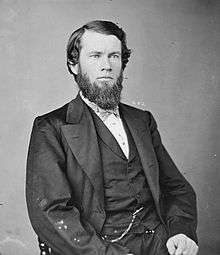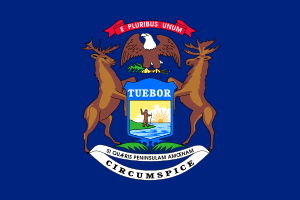Thomas W. Ferry
| Thomas White Ferry | |
|---|---|
 | |
| President pro tempore of the United States Senate | |
|
In office March 9, 1875 – March 17, 1879 | |
| Preceded by | Henry B. Anthony |
| Succeeded by | Allen G. Thurman |
| United States Senator from Michigan | |
|
In office March 4, 1871 – March 4, 1883 | |
| Preceded by | Jacob M. Howard |
| Succeeded by | Thomas W. Palmer |
| Member of the U.S. House of Representatives from Michigan's 4th district | |
|
In office March 4, 1865 – March 3, 1871 | |
| Preceded by | Francis William Kellogg |
| Succeeded by | Wilder D. Foster |
| Member of the Michigan Senate | |
|
In office 1856 | |
| Member of the Michigan House of Representatives | |
|
In office 1850–1852 | |
| Personal details | |
| Born |
June 10, 1827 Mackinac Island, Michigan |
| Died |
October 13, 1896 (aged 69) Grand Haven, Michigan |
| Political party | Republican |
| Profession | Politician, Merchant |
Thomas White Ferry (June 10, 1827 – October 13, 1896) was a U.S. Representative and U.S. Senator from the state of Michigan.
Biography
State legislator
Ferry was born in the old Mission House on Mackinac Island, Michigan. The community on Mackinac at that time included the military garrison, the main depot of John Jacob Astor's American Fur Company, and the mission. His father was a Presbyterian pastor, the Rev. William Montague Ferry, and his mother was Amanda White Ferry; together his parents ran the mission school.
Rev. Ferry also was the pastor of the Protestant church on the island. Thomas moved with his parents to Grand Haven, Michigan, attended the public schools, and engaged in mercantile pursuits. He worked as a store clerk in Elgin, Illinois for two years from 1843 to 1845 before returning to Michigan.
He was a member of the Michigan State House of Representatives from 1850-1852 and a member of the Michigan State Senate in 1856. On January 26, 1857, Ferry, with his father William Montague Ferry, platted the village of Ferrysburg, Michigan, which his father had first settled in 1834.
United States Senator
He was a delegate to the Loyalist Convention at Philadelphia in 1866. He was elected as a Republican to the United States House of Representatives for the 39th, 40th, and 41st Congresses, serving from March 4, 1865 to March 4, 1871. He was re-elected to the U.S. House for the 42nd Congress in the general election of November 8, 1870. The Michigan Legislature subsequently elected him to the U.S. Senate on January 18, 1871 and Wilder D. Foster was elected in a special election on April 4, 1871 to fill the vacancy in the House. Ferry was reelected to the Senate in 1877, and served from March 4, 1871 to March 4, 1883. He was an unsuccessful candidate for reelection in 1882. Ferry was the first person from Michigan to have served in both houses of the Michigan State Legislature and in both houses of the United States Congress. The second person to do so is Debbie Stabenow.
While Senator, Ferry was chairman of the Committee on Rules (Forty-third through Forty-fifth Congresses) and the Committee on Post Office and Post Roads (Forty-fifth and Forty-seventh Congresses), as well as President pro tempore of the Senate during the Forty-fourth and Forty-fifth Congresses. In this capacity, he became, upon the death of Vice President Henry Wilson on November 22, 1875, next in the line of presidential succession.[1]
He presided over the 1876 impeachment trial of U.S. Secretary of War William Belknap and the meetings of the Electoral Commission created by Congress to resolve the disputed 1876 presidential election. Still president pro tempore at that time, he would have temporally become the Acting President had the Electoral College vote not been certified by Inauguration Day – Monday, March 5, 1877. Following precedent, Hayes' inauguration was held on March 5, because the statutory date, March 4, fell on a Sunday. Although the election dispute had been resolved on March 2, Ferry may have believed that he indeed was Acting President on March 4–5 1877, due to the fact that President Rutherford B. Hayes and Vice President William A. Wheeler both took their respective oath of office publicly on March 5, rather than March 4, thus, in his mind, leaving both offices vacant and him the statutory successor to the presidency. What he and the general public were unaware of however, was that Hayes had taken the oath in a private ceremony held at the White House on March 3, satisfying constitutional requirements and, for all legal purposes, becoming President on March 4.[2]
Ferry died in Grand Haven, Michigan at aged 69. is interred in Lake Forest Cemetery.
See also
- William Montague Ferry, Jr.: brother
Bibliography
- Dictionary of American Biography
- Ziewacz, Lawrence E. "The Eighty-First Ballot: The Senatorial Struggle of 1883." Michigan History 56 (Fall 1972): 216-32.
Notes
- ↑ Feerick, John D.; Freund, Paul A. (1965). From Failing Hands: the Story of Presidential Succession. New York City: Fordham University Press. p. 116. LCCN 65-14917.
- ↑ Bomboy, Scott (August 11, 2017). "Five little-known men who almost became president". Constitution Daily. Philadelphia, Pennsylvania: National Constitution Center. Retrieved July 18, 2018.
References
- United States Congress. "Thomas W. Ferry (id: F000095)". Biographical Directory of the United States Congress.
- Thomas W. Ferry at The Political Graveyard
External links
| U.S. House of Representatives | ||
|---|---|---|
| Preceded by Francis W. Kellogg |
Member of the U.S. House of Representatives from Michigan's 4th congressional district March 4, 1865 – March 4, 1871 |
Succeeded by Wilder D. Foster |
| U.S. Senate | ||
| Preceded by Jacob M. Howard |
U.S. Senator (Class 2) from Michigan March 4, 1871 – March 4, 1883 Served alongside: Zachariah Chandler, Isaac P. Christiancy, Henry P. Baldwin, Omar D. Conger |
Succeeded by Thomas W. Palmer |
| Preceded by Henry B. Anthony |
President pro tempore of the United States Senate March 9, 1875 – March 3, 1879 |
Succeeded by Allen G. Thurman |



